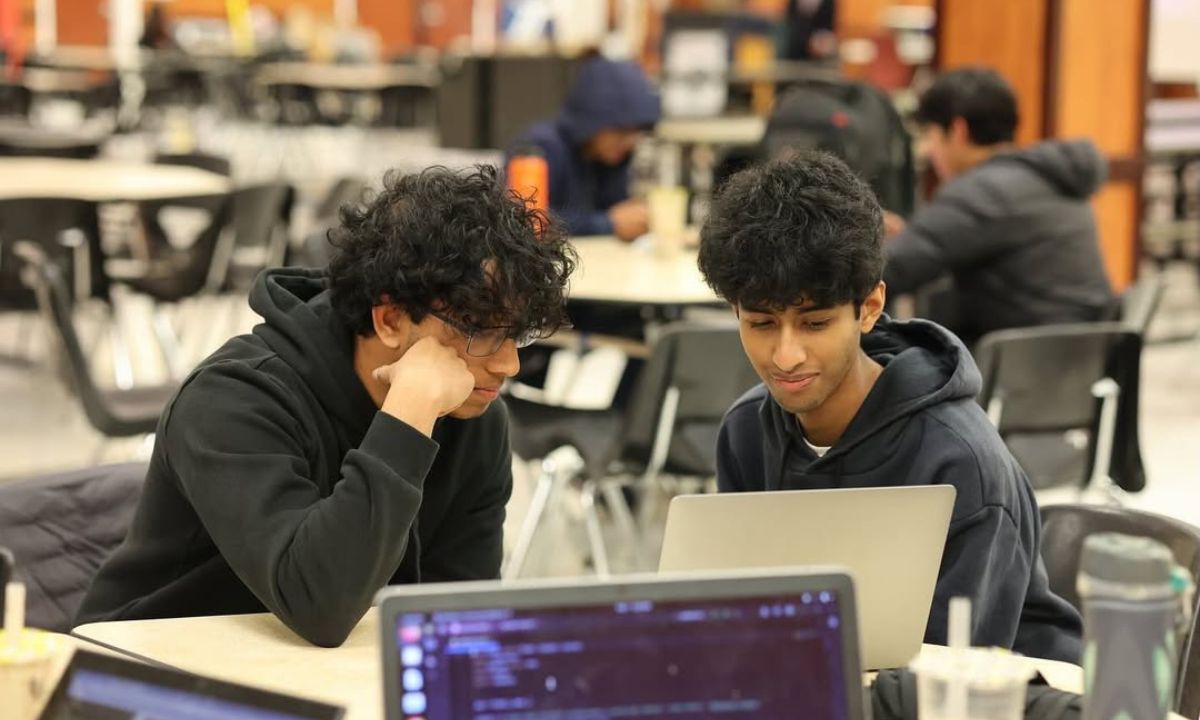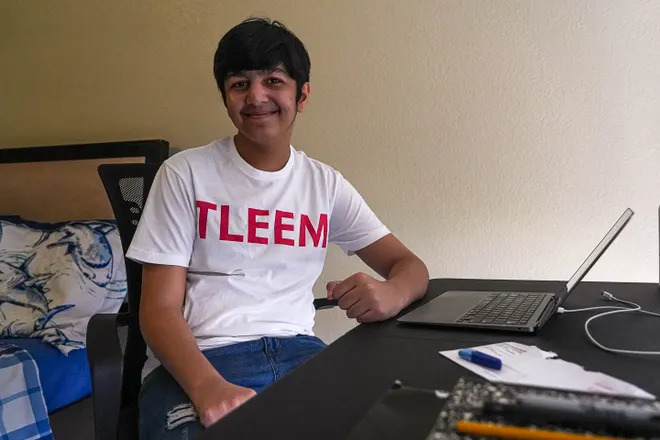Texas Teen’s Nonprofit Helps Kids Across the World Gain Networking Skills
Arjun Sharda, 13, began Tleem in his middle school. Today, it hosts contests & speakers, links members with college & business leaders in 11 countries

Get stories like this delivered straight to your inbox. Sign up for The 74 Newsletter
When 12-year-old Arjun Sharda pitched his plan to form a networking club in 2023, his middle school teachers cast doubt on the idea.
Running Brushy Middle School near Austin, Texas, had clubs about Star Wars, Pokemon and anime, but 12- and 13-year-olds wouldn’t be interested in serious topics like networking, they said.
“There was no real indicator that it could actually survive in the school as an actual functioning club,” Arjun said. “We didn’t even have that many teacher sponsors because, at first, the idea was hard to push. But at one point, I actually got to secure a meeting with the principal of my school … he gave us a lot of opportunities to grow.”
After Arjun presented his club idea to his seventh-grade class in September 2023, students became interested in networking with business leaders, building skills through competitions and connecting virtually with peers across the U.S. When Arjun’s family moved a month later and he transitioned to homeschooling, he registered the club as a nonprofit that has since engaged more than 4,000 students around the world.
The organization, Tleem, is based on the Arabic word taleem, which means “education.” It also stands for Arjun’s interests of technology, leadership, entrepreneurship, engineering and mathematics.
Arjun, now 13, grew up wanting to create his own business to help better the world, but his age was always a barrier when trying to find networking opportunities. His family was low-income and couldn’t afford to send him to events like South by Southwest, a conference in Austin that attracts professionals in tech, music, education and media. Online resources like LinkedIn require users to be at least 16 years old.

“Oftentimes I hear older people calling us [kids] creative, right? If we’re called creative, why can’t we use that creativity to solve some of the world’s biggest problems?” he asked. “Unfortunately, there are barriers for K-12 [students] to network.”
Today, Tleem has 37 chapters in 11 countries, including the U.S., Canada, Japan, India, Indonesia, Morocco and Pakistan. Some meet in person, while others are hybrid or virtual.
Students can apply to create a club or have an existing club become a local chapter. Tleem student volunteers help chapters boost membership, host speakers, participate in competitions and network with business leaders. The nonprofit also connects chapters with each other.
Tleem will challenge club members to reach specific networking goals such as cold emailing or meeting a certain number of people. Arjun said one of the most popular competitions Tleem helps chapters with are hackathons, which are local contests that challenge student teams to build coding projects within a short timeframe.
Pavan Kumar, a 17-year-old who attends Granite Bay High School near Sacramento, California, recently helped one Texas chapter secure company sponsors to fund a hackathon as part of Tleem’s chapter committee. The group consists of chapter presidents across the U.S. that help other Tleem clubs accomplish networking goals.
As president of his school’s College and Career Club, Pavan applied to Tleem last summer to boost student networking opportunities and resources.
Tleem helped Pavan with a marketing campaign that doubled club membership from 80 to 160 students in five months. Tleem volunteers also schedule virtual guest speakers at the club’s biweekly meetings, like staff at UC Santa Barbara who give admissions advice.
“The main thing about our College and Career Club is to help students progress in high school, and what I personally believe really helps is getting those connections,” Pavan said. “I think networking is the most valuable asset any student can have — if you have the right network in high school, elementary, even middle school, that is going to propel your experience in whatever grade you are.”
Education experts and researchers estimate about half of internships and jobs are obtained through personal connections, while exposure to working adults and strong youth-adult relationships influences student career aspirations and persistence in school.
Ariv Sahoo, a 17-year-old from Dougherty Valley High School east of Oakland, California, said his Mobile Application Development Club has connected with entrepreneurs and tech founders by participating in Tleem. Members have even found internships and mentorships by networking with guest speakers the nonprofit has helped book, such as Datta Junnarkar, a chief information officer for Boeing.
“When students wait until they’re upperclassmen to start networking, they often miss out on internships, mentorships or leadership roles that require prior experience or connections,” Ariv said. “Networking through Tleem gave me direct access to professionals in tech, business and nonprofit leadership — people I would’ve never met otherwise.”
Arjun said he hopes Tleem can increase its membership to 10,000 students by the end of the year. The nonprofit recently partnered with Walmart to provide microgrants of $25 to $100 to student-led projects in Austin, Texas.
“As a child, you still have that potential to explore, and that’s one of the best times to network,” Arjun said. “Getting to know about other people, getting to learn your passion, what you truly want to do, is something really powerful.”
Get stories like these delivered straight to your inbox. Sign up for The 74 Newsletter

;)
